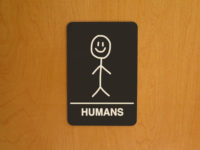‘Gender Neutral’ Language – Progress or a Step Too Far?

Earlier this week, Berkley Council in California made the decision to replace words within its municipal code with ‘gender-neutral’ language.
It has altered dozens of masculine and feminine pronouns, replacing “he” and “she” with “they” and “them” in an effort to “promote equality”.
Other gendered terms will change to specific nouns such as “teacher” or the “council member”.
“Manhole” will be replaced with “maintenance hole”, “manpower” with “human effort” and “fraternal” with “social”.
Moving forward, “heirs” will change to “beneficiaries” and “maiden” name to “family”. “Craftsman” will be replaced by “artisan.”
Reflection of ‘social change’
The council voted unanimously to the changes, with a spokesperson saying that the move reflects a broadening awareness of transgender and gender nonconforming identities, going on to explain that the municipal code had previously used male-centric terms, which needed to be updated to both reflect the people the council serves, and become more inclusive.
The move has been met with divided opinion. Some say it’s a progressive step forward, others believe it’s a step too far and political correctness gone mad.
After the move, one of the sponsors of the change, Mr Rigel Robinson explained on Twitter: “Women and non-binary individuals are just as entitled to accurate representation. “Our laws are for everyone, and our municipal code should reflect that.”
Changes to the code will reportedly cost the council less than $1,000, nevertheless many local residents have been angered by the move which they say is completely unnecessary, and that the council should be devoted to spending time and resources on more pressing matters.
Language is evolving
For many years the social vernacular has been changing. For example, in recognition of the fact that being an “air-hostess” is no longer a female-dominated profession, the role has become known as “air steward” or “flight attendants.” Similarly, Policeman and Fireman, have become gender neutral “Police Officer,” or “Fire Fighter.” These are words we now use without necessarily considering how they became part of our language.
As another example, earlier this year, the Guardian Newspaper announced it was changing its internal style guide to ensure accuracy in climate change-related reporting.
At the time, editor-in-chief, Katharine Viner, said: “We want to ensure that we are being scientifically precise, while also communicating clearly with readers on this very important issue,”. “The phrase ‘climate change’, for example, sounds rather passive and gentle when what scientists are talking about is a catastrophe for humanity.”
While the Guardian’s move prompted other media outlets to consider the language they use in their own reporting, overall the story barely created a ripple in the headlines or on social media.
Similarly, every year the Oxford English Dictionary makes a list of new inclusions into its pages, to ‘better reflect’ the language we use as an English-speaking society. This year the focus was on ‘colloquial’ terms and a handful of originally Scottish words were added into the dictionary.
In recent years, the focus of the Dictionary has been to expand the language to include slang, with the word ‘awesomesauce’ being added a few years ago, resulting in some public consternation. After all, it’s a word that is used by very few people. A minority.
But when it comes to sexuality and sexual identity, the issue of language is much more emotive, more often than not, polarising.
And, of course, it does raise questions. Do gender-neutral terms really serve and reflect the diversity of the human race? Or do they provide ‘blanket categories’ that bundle us all into one group, without pause for our differences, those very characteristics that make us unique and individual? And, do they in some ways obliterate our own very personal preferences? What if someone prefers to be referred to as a ‘woman’ rather than a ‘person’, or ‘individual’? And does it really matter anyway?
There is, obviously, a need for language to change in line with the way we use it to communicate. The rise in texting over the past decade or more has led to the development of a global “shorthand” that we’ve all learned along the way – acronyms, symbols, gifs. Many actual words have been replaced on this communication platform, and while there has been the odd protest about the demise of the English language, this new form of ‘language’ still grows exponentially day-by-day as people find new ways to write clearly, but expediently.
So, has the Berkley Council got it right? Or has it gone too far?
“Sorry, what is this nonsense. Unbelievable,” one Twitter user wrote.
Another said: while another said: “This is truly what is wrong with American Liberalism. Instead of fighting for progress they have devolved into Orwellian doublespeak.”
There was some support for the change, with one Twitter user thanking the council, saying “You are 100 per cent correct and it does matter.”
While a Municipal Code is a legal document, because it is a published compilation of city laws, the Council has made it clear that it is not legislating the way that people speak.
So whether or not people agree with the changes, they still have personal choice about adopting the words into their own personal vocabulary.
It is important to remember that words do have great power. But what’s more important, is how those words are used.







